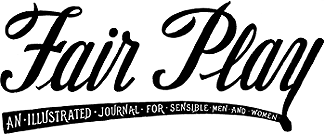- Magazines and Journals
- Explore
- Fair Play

Fair Play
Background
Region
National
Available online
1893-1894
Also published as:
Fair Play : An Illustrated Journal for Sensible Men and Women
Fair Play, subtitled "An illustrated journal for sensible men and women", was published in Wellington by the well-known printing firm McKee and Gamble from 1893 to 1894.
Although registered as a newspaper, it was more correctly classified as an illustrated serial, focusing on political and cultural topics as well as gossip, sport, light literature and satirical sketches of public figures. It was published weekly from November 1893 to April 1894, and then monthly from May 1894 to November 1894, when it stopped being produced.
Fair Play aimed to be liberal and unbiased, declaring itself to be "against prohibition of any kind" and free from the "manacles" and "slavish obedience" to political and social interests it saw constraining the rest of the New Zealand press.
Although the paper billed itself as "an unprejudiced New Zealand weekly" and proudly declared that "Fair Play is a jewel", it was strongly opinionated. Fair Play stated in the first issue that when it came to prominent citizens it intended to "attack [them] honestly and fairly in the lists of public opinion". However this policy may have backfired on the paper's publishers. A successful libel suit brought by Francis Dillon Bell against Fair Play in February 1894 may have damaged it both publicly and financially.
The original editor, WE Hammond, arrived from Australia in June 1893 to take up the position but resigned in April 1894 when it was decided to change from weekly to monthly publication. Arthur McKee, previously the paper's manager and one of its publishers, took over the editorship in May 1894, promising more local content. If the change in format was intended to rejuvenate the paper, it did not succeed and the last issue appeared in November 1894.
The reason for Fair Play's demise is uncertain. Although the paper was similar to the successful Auckland paper the New Zealand Observer and the later New Zealand Free Lance, it may have been that Fair Play was too opinionated and satirical for its own good.
Arthur McKee continued to have a successful career, being one of the directors of the well-known Cyclopedia of New Zealand, as well as continuing his partnership in the McKee and Gamble publishing company. WE Hammond took a job with the New Zealand Times and worked in journalism in Auckland before leaving New Zealand in 1900.
Copyright statement
See our copyright guide for information on how you may use this title.
 Log in
Log in